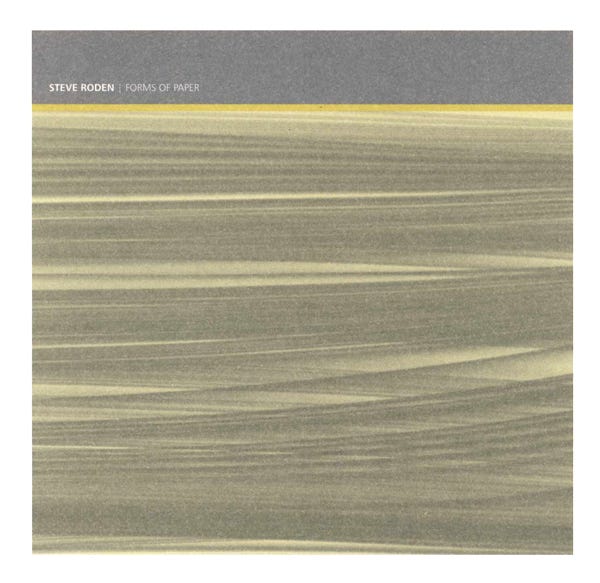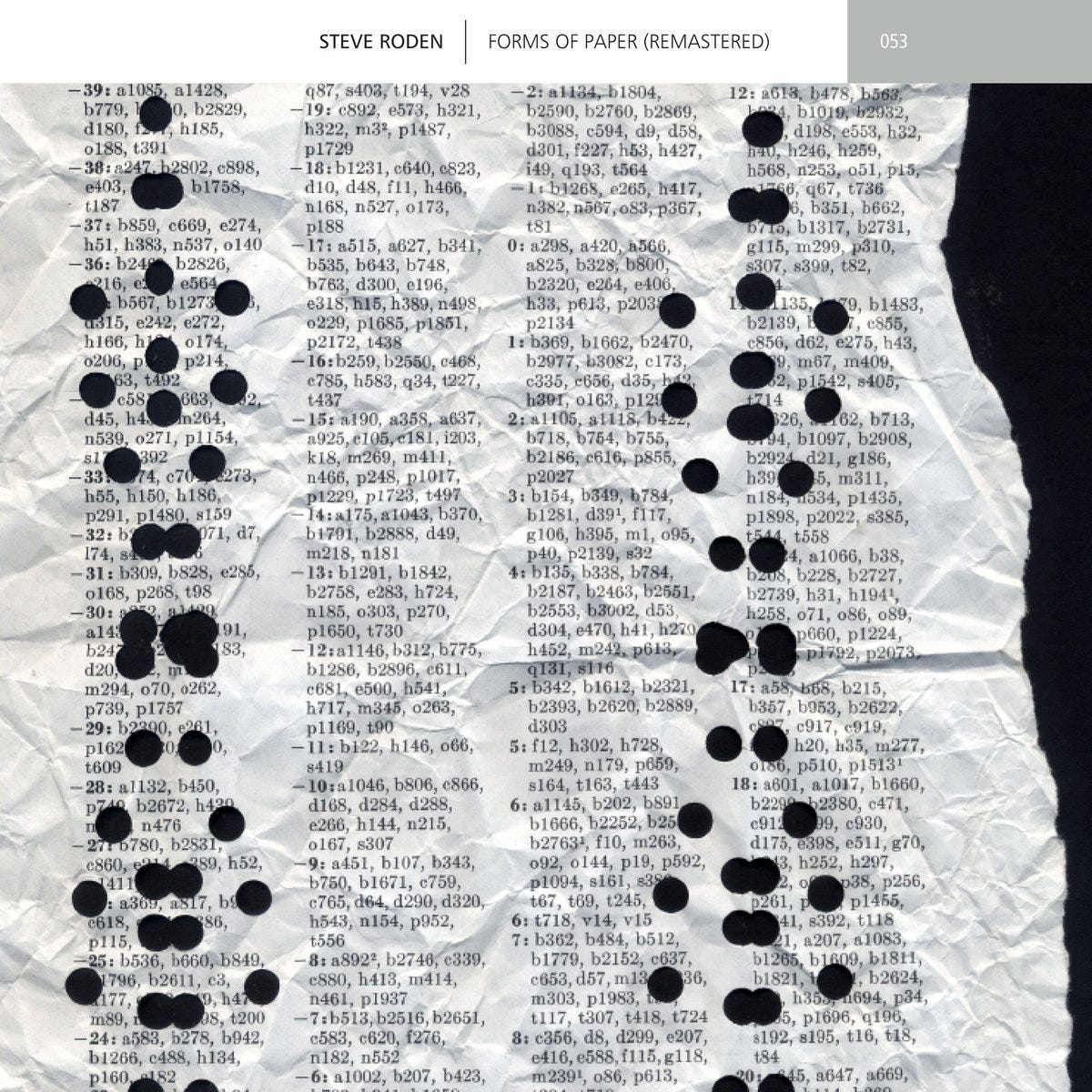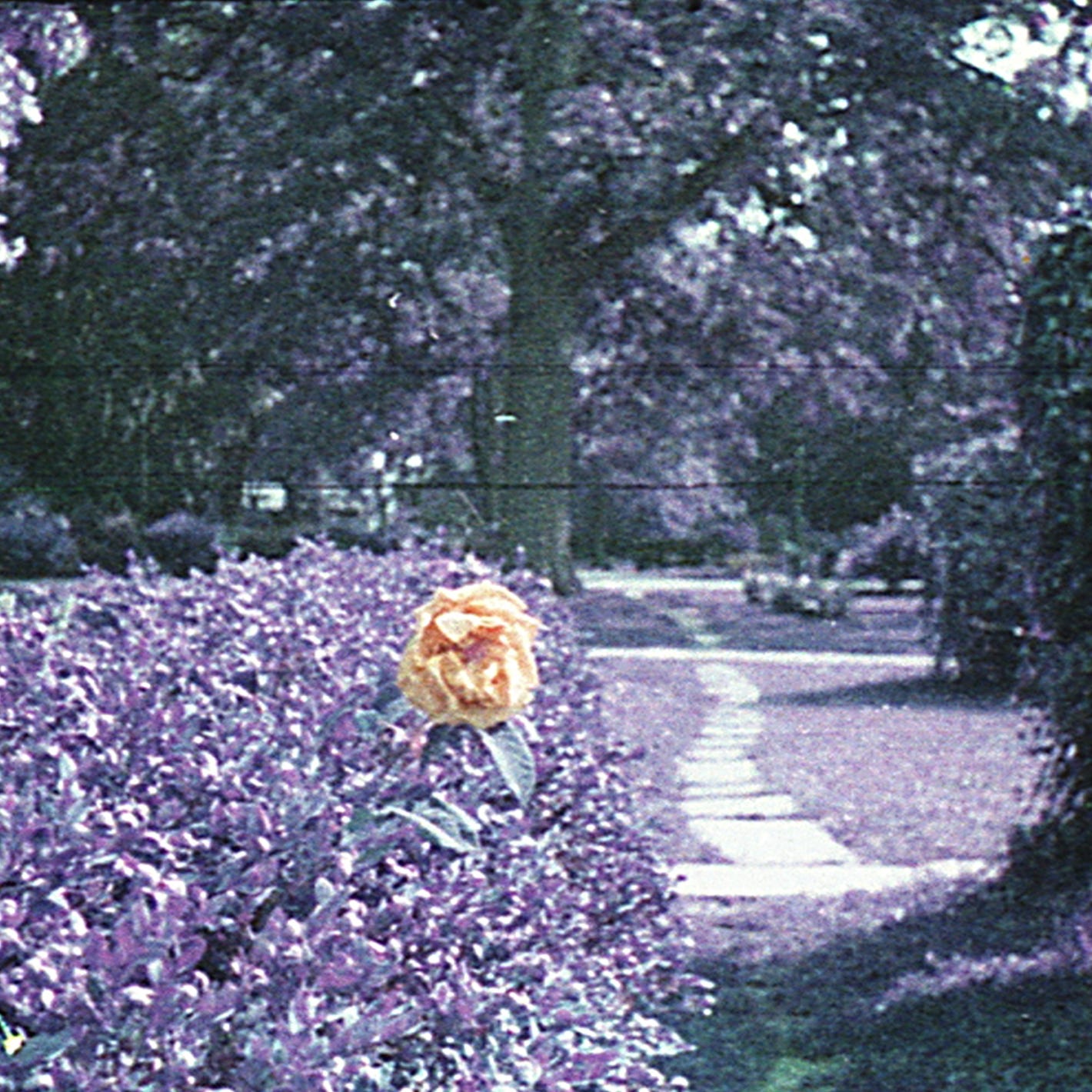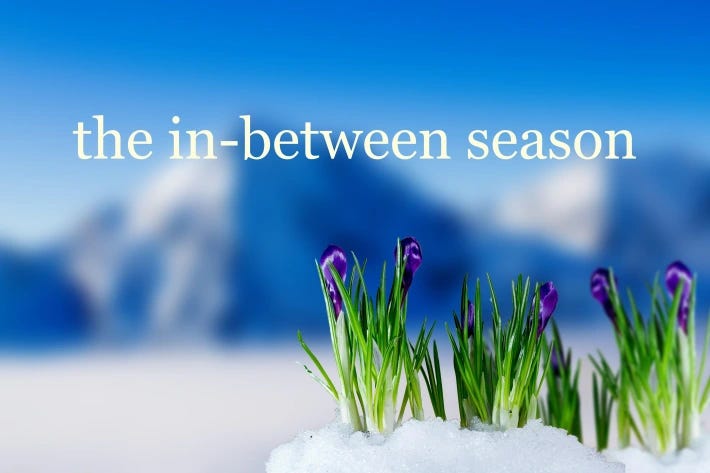Dear Listeners, Joseph here for another bi-weekly digest of the best of ACL. Have you had a chance to absorb our previous edition? We published our longest ever article earlier this week, Ukrainian Field Notes XLI, to mark the third anniversary of Russia’s full scale invasion of Ukraine.
In other news, our friends at Longform Editions have released their final batch of four recordings (from Fennesz, Tujiko Noriko, Natalia Beylis, and whait), as well as a bonus composition from Angel Bat Dawid. I’m still really enjoying their previous batch, especially the doom jazz of The Nighttime Ensemble, so I’ve yet to dig in yet for what will certainly be bittersweet final batch from Longform. And of course the archive is always there to be revisited.
Speaking of endings, Frans de Waard and co. have announced, with significantly less fanfare, that “Vital Weekly will end with issue 1500 in about 30 weeks.” We’ve read VW for longer than we care to admit (we’re getting old), and we’ve long admired their brevity and unpretentiousness, as well as their simple dedication and consistency over many decades. For those who are unfamiliar (or only able to consume music criticism in the form of obnoxious videos, which is likely excludes you from reading this here missive), Vital Weekly is the world’s oldest e-mail magazine, beginning as a paper magazine which ran from 1986-1995, all 44 issues of which were collected in a 2020 edition available here, surely of interest to fans of experimental music. VW only review physical submissions, which we love about them, though now after decades of (sometimes not so) slowly rising postal costs, perhaps this has contributed to the sense that it is time to put the project to bed. We’re sad to hear this, but I do appreciate endings, and 1500 is a nice and respectable place to end.
I played flute in concert and jazz band when I was a kid, 4th through 8th grade. I had wanted to play the sax but there was too much competition. I wanted to continue on in high school but since marching band was mandatory I opted out. But I often credit those four years as catalyzing an early appreciation for jazz. Around 4th or 5th grade, so about 1995, my music teacher gave me a “Jazz Mix” cassette she had dubbed for me, having recognized my interest in jazz. I recently found that cassette tape; the b-side is full of mid 1990s alt rock radio singles, Nirvana, Pearl Jam, Smashing Pumpkins, No Doubt, etc. The a-side is just labeled “Jazz Mix,” and if I ever had a tracklist I lost it long ago, so oddly I haven’t had a clue what music I was actually exposed to back then, and instead have clearer memories about exposed to jazz more deeply in college. So I’m listening to it now. At some point, apparently 1999, I recorded over part of the a-side, as the tape begins with more late 90s radio fare before cutting into an interview with Blink 182, in which they and the K-Rock DJ discuss why that can’t talk about labia or say f*****t. [Oh! to not have to revisit the turn of the millennium…] Anyway, the radio dub eventually ends and we’re back to jazz and it’s mostly big band stuff, Benny Goodman and the like. Shrug. I feel like there was probably some Sam Most and Herbie Mann on there? Still, might account for my early affinity for the films of Woody Allen.
And another reminder that the ACL internet radio show is live at CAMP, airing every other Sunday at 6pm CET and available on their Mixcloud soon after. Tune in this Sunday to hear a post-rock heavy mix of the reviews featured in this very newsletter, bookended by some field recordings from rural Borneo. Until next time, happy listening.
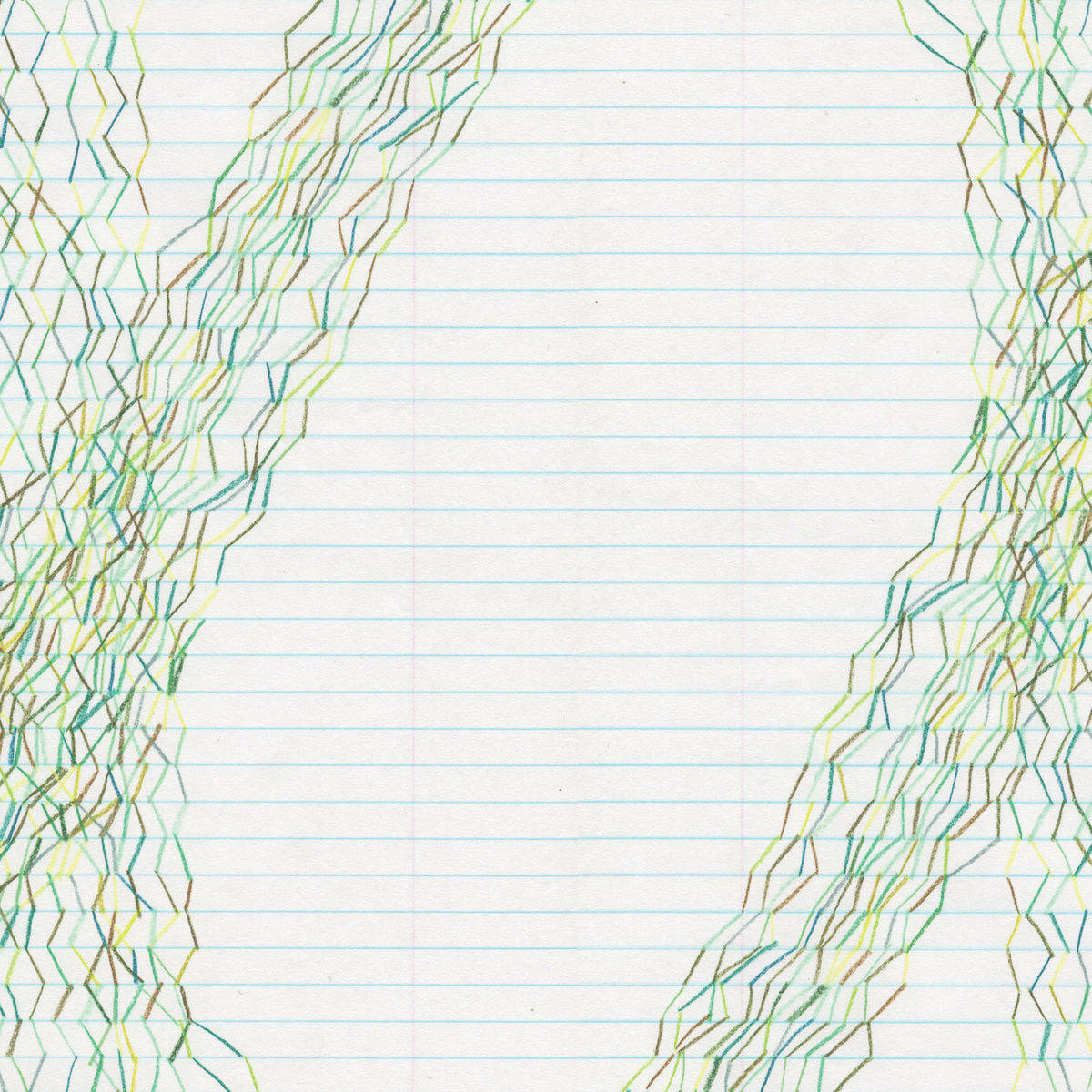
Forms of Forms of Paper
With LINE’s 2024 remaster of Steve Roden’s Forms of Paper (2001), there are now three separate masters of this lowercase classic. Forms of Paper was the work that introduced me, and surely many others, to Roden’s work. The 2011 remaster came out shortly before I met him in person, during a workshop and later performance as part of the 2012 edition of Suoni per il Popolo in Montreal. (You can read my long conversation with Steve here.) That tenth anniversary digital edition came with an 8-page essay, “on lowercase affinities and forms of paper,” which, among other things, made a case for the need for a remaster. For those reasons, I prefer that Bernhard Günter 2011 master, and was convinced by the artistic case Steve lays out in that document. With the release of a 2024 master by Taylor Deupree, who also mastered the original 2001 version, I thought it’d be interesting to evaluate all three versions of the record here.
Steve Roden (1964-2023) was an artist based in Pasadena, presenting his work since the mid-’80s. Above all, perhaps, Steve was a painter, but his work also extended to sculpture, mixed media, and of course works of sound and music. In contrast to a sort of radical openness suggested in each piece he made, Roden adopted a series of self-imposed rules, or created idiosyncratic notation to act as a guide, by which to execute creative decisions. A true bricoleur, this at times entailed limiting the tools or resources at his disposal, often with no regard for “fidelity” or technical processes. Forms of Paper is emblematic of this, made with only the sound of leafing through a book, and the very first time Steve ever used a computer to compose. The piece was originally created as a sound installation diffused at very low volume in the Frank Gehry designed Hollywood Branch of the Los Angeles Public Library.
Steve Roden ~ Forms of Paper (2001)
All of the sounds in the composition are the sounds of book pages being handled. This cd version has been expanded and re-worked into a one hour composition. Roden says of the CD “I imagine the work as something of a folded piece of white paper sculpture; where shadows, folds, and light enable one to see not only the white of the paper, but a full spectrum of grays as well.”
This CD wasn’t on my radar when it was released (I was in a very different headspace then), but discovering Steve’s “lowercase” music some years later had a profound effect on how I listen to music, as well as encouraging me to pursue my own creative practice irrespective of trends or expectations. I can’t recall if I heard this version first, but I don’t have a physical copy and since it isn’t available digitally I suspect I first heard the remaster. So in many ways I’m partial to the remastered 2011 edition, as it was how I first encountered the work, but also because that edition comes with an essay that makes a strong case that this 2001 edition distorts Steve’s intention for the work. Simply put, the master is far too loud, and listening at that volumes reveals sonic artifacts that Roden didn’t mean to draw attention to, especially as he was unfamiliar working with digital audio workstations.
Forms of Paper was the first sound piece Roden made using a computer. I associate the work with 12k perhaps because Steve’s association with Taylor Deupree, and the fact that Deupree mastered both the original edition for LINE as well as the 2024 master. But perhaps because this is a release for LINE, and because Steve was using a computer to compose for the first time—and of course, that this was also a work for installation in a library—it makes perfect sense that Forms of Paper begins with a minute of digital silence. The listener may, in that time, begin to listen to their surrounding with the sensitivity the work calls for. Then again, it doesn’t call for much; it is lowercase in the sense that it doesn’t, or shouldn’t call attention to itself. And for that reason, I prefer the gentler master of the tenth anniversary digital edition.
Steve Roden ~ Forms of Paper (2011 remaster)
Remastered by Bernhard Günter and released for its tenth anniversary, this version also begins with a minute of digital silence. The accompanying PDF document, “on lowercase affinities and forms of paper,” details the history of the work, how it has become tangled up with the term “lowercase,” and why a remaster was necessary.
Roden begins by noting that he met Bernhard Günter in 1997, and it was he who, in 2001, introduced him to ProTools and encouraged him to consider how he might use the DAW as a composition tool. This story goes some way to establishing Günter’s credentials in overseeing the remaster, though Roden has yet to express any apprehensions about the character of the 2001 CD. He first describes the recording and composition process, which included using regular and contact microphones to record “performances” manipulating the pages of a book, which he then processed in ProTools, filtering with EQ and then looping and mixing the results. The initial installation “rested upon the layer of modified papers”—hole-punched pages from a discarded textbook that also make up the cover art of this edition—“playing a quiet composition that was soft enough that the sound never reached the upstairs area.”
He then spends several pages detailing the origins of the term “lowercase” to describe his own personal aesthetic, and how the spread of that term to wider significance is tied up with the CD release of Forms of Paper in late 2001.
…in 1997 for The Wire, I mentioned that my artistic tendencies were “lowercase”. I had been using this phrase since the mid-1980’s to set my work apart from the bombastic nature of painting at the time via artists like Julian Schnabel. While the artworld and popular culture seemed to favor spectacle, I was interested in silence, humility, intimacy, and thus began to describe my work as having a lowercase aesthetic—and I viewed the term as a quiet form of protest.
That quiet protest resonated with a variety of musicians at the time, uniting a wide variety of practitioners exploring “silence” and quiet, from laptop musicians to electroacoustic improvisers to free jazz musicians. As is the way with such things, the term took on a life of its own, though Steve still insists upon an openness in its interpretation.
Roden finally turns to the question of the master on the final page:
I sent the final mix to Taylor Deupree a few weeks before 9/11, but because I was traveling at the time I wasn’t able to hear the mastered track until the cds had been manufactured. Truth be told, the first time I heard it, I was not happy. Because I tended to mix my own work at a relatively quiet level, the mastering process necessitated upping the gain, which brought out a number of sounds that I had never even heard. the disc sounded relatively ok at a very very low volume, but if anyone listened to it at a normal listening volume or on headphones, it wasn’t the piece I’d intended at all. … It didn’t help that people seemed to really like the disc, many suggesting it was my best.
He expressed his dislike of the CD version to Bernhard Günter when they toured together in the American southwest some months later, and Günter offered to remaster it to Steve’s liking for his personal archive, which he did, and which would later be released as this high-quality digital download by LINE for the work’s tenth anniversary.
Steve Roden ~ Forms of Paper (2024 remaster)
So what, then, is the case for the new 2024 remaster by Taylor Deupree ? The release of the work on two new formats, for starters. Mexican label Aurora Central Records has just released Forms of Paper on vinyl and cassette editions for the first time. As we can see in the above comparison, it largely restores the added gain of the disliked CD version, while largely flattening the stereo image. The opening minute of digital silence has also been removed, as has that at the end, shortening the work from about 54 to 48 minutes. I’m unconvinced of the necessity of this cut, particularly as it seems minor but changes the structure and thus the integrity of the work, however I can entertain that the media of tape and vinyl have less to offer the digital silence than CD or digital versions might. Still, I think that silence is important as a threshold for a work that is intended to be listened to at very low volume. But I still have that 2011 remaster which I can listen to at my convenience, and I’m excited to own a copy of this important work on cassette.
RECENT REVIEWS
Reviews are at the heart of ACL. Here are selections from a few of my favorite reviews we posted on the blog in the last few weeks.
Ai Yamamoto + Dan West ~ Microdoses
The new partnership of Ai Yamamoto + Dan West is dedicated to the natural world, and is available on bark or foliage vinyl. One cool aspect of the brown edition is that the grooves are reminiscent of growth rings. In like fashion, the music begins and ends in humble fashion, with a flourish in the center. One can hear springtime approaching, and at the end, receding into a soft, autumnal hush. Microdoses comes to an end, cycling back to its ambient beginning, lowering itself to the earth like a forest bather to soft, welcoming loam. West’s wistful guitar conveys a sense of gratitude for the natural world, which gives so much while asking for nothing in return.
Andrzej Pietrewicz ~ #9
Seeing the title takes one back to John Lennon reciting, “#9, #9, #9” on “Revolution 9,” the most unusual track on The Beatles’ White Album. Packed with tape loops, samples and spoken word, the track divided critics and flummoxed fans. In light of all that has unfolded in experimental music since then, the track has aged surprisingly well, even losing its original shock value. Similar words may one day be written about the compositions of Andrzej Pietrewicz, who continues to expand the boundaries of religious music. Across his nine releases, he has grown progressively more experimental, with a concurrent rise in confidence. His use of spoken word and sigh, texture and field recording may be atypical, but underline the mystery inherent in descriptions of the ineffable. A traditional older worshipper might even consider such music strange, but at previous junctures in Christian music, various approaches and instruments were considered inappropriate or even unholy, including harmony, the use of organs in church, guitars and praise bands – only to become mainstream, their prior affronts forgotten.
Antarctic Wastelands ~ Worlds: Collide
Four continents, seven tracks, eight guest stars, twenty-two minutes of music: Worlds: Collide is a crash course in ambience, the tonal opposite of the 1951 sci-fi film it references. The music shimmers like Cynthia Bernard’s cover art, and seven related images are distributed to the tracks. Should one be worried about worlds colliding, or anxious about the state of the world as it is, this EP is the panacea. The highest-profile piece, “Emerging (with Be Still the Earth & Hollie Kenniff) is content to interact with the others like streams to the sea; no jutting personalities, only a desire for commonality. Flipping the script of the prior piece, a pulse emerges as the track progresses. Then everyone goes home. In the end, Antarctic Wastelands is left to reflect on the collaborative effort, his soft piano a gentle thanksgiving.
Guy Buttery ~ Orchestrations
It would be difficult to choose the most appealing aspect of Guy Buttery‘s Orchestrations. Is it the fact that a tree is planted for every purchase? Is it the international flavor of the 17 collaborators, who hail from ten different countries? Is it the chance to hear Buttery’s compositions fleshed out? Fortunately, we need only choose where to begin. Thirteen years ago, Buttery first heard what his pieces would sound like when performed with a 52-piece orchestra. As a solo guitar piece can become an orchestra, as a seed can become a forest, so can an idea become a movement, a truth revealed between two chords.
Hour ~ Subminiature
Subminiature gives us a new way to appreciate Hour. The live album collects performances from multiple locations in a spoke radiating around the ensemble’s Philadelphia home. Five tracks are included from the first album (including two versions of “Doxology”), four from the second and five from last year’s Ease the Work, as well as a surprising cover of Patsy Cline’s “I Fall to Pieces,” vocals intact. There must have been quite a discussion over which pieces to include, as Hour doesn’t have any bad tracks; the decision was made based on the renditions. With Subminiature, Hour has brought us something old and something new. On their winter tour, as they expand their reach even further, others will be able to experience their magic in person; for now, the world has this Valentine’s Day gift.
Mogwai ~ The Bad Fire
All Mogwai albums are good albums, and some are great albums. Is The Bad Fire one of the greats? The answer may depend on how many of the eleven the listener has heard, as well as the age of the listener, as each album communicates nostalgia for the musical forms of prior decades. The Scottish post-rock band was formed in 1995, which makes this their 30th anniversary, an achievement in itself. As we’ve come to expect from Mogwai, a few vocal tracks are included, referencing the shoegaze music of their childhood. Not that they include a lot of lyrics[…] But for us, it’s all about the instrumentals. […] The last two minutes offer a long, gentle wind-down. The arc of the album reflects the course of the past four years: the struggle, the reflection, the eventual peace. There’s also a bonus this time out: a two-disc Deluxe Edition that includes a disc of demos.
Yii Kah Hoe, Nigel Brown, Yannick Dauby, William Kok (with Juis Migan) ~ Bung Jagoi – In the Forest / In the Village
Three field recordists and a cinematographer walk into a forest. What comes next is not a punchline, but a story. Earlier this year, Yii Kah Hoe, Nigel Brown and Yannick Dauby, along with William Kok, visited the Borneo village of Bung Jagoi, and collected hours of pristine recordings. They also spent time in the village, listening to the stories of Juis Migan, and returned with two hours worth of material, now available as a double release. Bung Jagoi is a “hidden jewel” of Malaysia, steeped in history and natural beauty. As ancestral home to the Dayak Bidayuh, the village preserves many ancient traditions, including the paddy harvesting festival, and most uniquely contains the Skull House, which remains filled with enemy skulls, although the few remaining residents no longer feed the skulls’ spirits. The 500-hectare rainforest is home to the Libuan Pinomu Waterfall and some incredible hilltop views. Note to tourists: you will not be considered enemies! The visiting artists treat the region and its residents with incredible respect: through film, field recording and interview, they capture indelible snapshots of unnamable value.
you, infinite ~ you, infinite
Back in 2005, This Will Destroy You made an immediate impact on the post-rock scene with the release of their debut album Young Mountain. The album cover, depicting a large bear carrying a house on its back, remains iconic, and the music holds up well two decades later. At the time, TWDY was an L.A. quartet including guitarists Chris King and Jeremy Galindo, bassist Raymond Brown and drummer Andrew Miller. Brown left to pursue a medical practice in Austin (home of Explosions in the Sky), and other members came and went, but Galindo, and the friendship, remained. Now the two have reunited as you, infinite, accompanied by three touring members of Galindo’s version of TWDY. you, infinite is one of the most calming post-rock albums in recent memory, building slowly to a mid-album release of energy, then returning to a more languid state. The track titles, from “Focus on Reflection” to “Understated” and “Dormant,” reflect this restraint. One cannot help but think that the music may be just what is needed in the aftermath of the L.A. wildfires. At an hour and five minutes, the album is patient and generous, exuding a sense of security, the ease of a lifelong friendship. The opening chords are like a slow, sedate fanfare, thick haze giving way to clear piano notes, like the contrast between smoke and breathable oxygen. Then the electronic percussion enters, a smooth and steadying presence. Writing from experience, this is great highway driving music.Two paths diverged in the woods, and re-converged. you, infinite offers a second chance to take the path not chosen.
UPCOMING RELEASES
(complete list with Bandcamp links here)
Depending where one lives, it’s either still freezing or already warm; welcome to the in-between season. Our Spring Music Preview will appear in mid-March. In the meantime, we’re tracking hundreds of upcoming releases, many of which are already available in pre-order, with links below. We hope you’ll find your next favorite album right here!
Blendreed ~ Tales of Tides (Tenorio Cotobade, 28 February)
Colossloth ~ The Harmony Knife (Cold Spring, 28 February)
Daniel Carter, Ayumi Ishito ~ Endless Season (577 Records, 28 February)
David Cordero ~ Los Secretos De La Luz (ARCHIVES, 28 February)
Devin Maxwell ~ Selfies (Infrequent Seams, 28 February)
Graintable ~ Music to Watch Seeds Grow By 003 (Music to Watch Seeds Grow By, 28 February)
Grup Ses and Gökalp K ~ S/T (Souk, 28 February)
Impérieux ~ Rezil (Macro, 28 February)
kilboure ~ If Not To Give A Fantasy (Hammerhead, 28 February)
Le Motel ~ Odd Numbers / Số Lẻ (Balmat, 28 February)
Matt McBane ~ Buoy (Gradient, 28 February)
Max Cooper ~ On Being (Mesh, 28 February)
Om Unit ~ Acid Dub Studies III (28 February)
Reiko Füting ~ distant: violin, sound (New Focus, 28 February)
Saffron Bloom ~ S/T (Delicate, 28 February)
Soft Suns ~ Cycles (28 February)
Thierry Holweck ~ Giraffes (Ombrelle Concrete, 28 February)
Tom Avgenicos x Delay 45 & Ensemble Apex ~ Ghosts Between Streams (Earshift Music, 28 February)
TU M’ ~ Monochromes Vol. 3 (LINE, 28 February)
V/A ~ Электронная Музыка АНС’ (ANS Electronic Music) (Cold Spring, 28 February)
Mads Kjeldgaard ~ Empty Cloud (Exformal, 1 March)
Darcy Gilkerson ~ Acteon (3 March)
After Osmosis ~ Slow Release (4 March)
Ciccio & 2mo ~ Live at Meakusma Festival 2024 (Meakusma, 4 March)
Dennis Egberth ~ The Dennis Egberth Dynasty (577 Records, 4 March)
Lawrence Lindell ~ B.A.M.O.L.L. (4 March)
Milk Eyed Sigh ~ Dog Verses (glint music, 6 March)
Alaskam ~ Fusion (7 March)
Alessandro Barbanera ~ In Darkness Let Me Dwell (Owl Totem, 7 March)
anthéne ~ frailty (Home Normal, 7 March)
Believers ~ Hard Believer (Shifting Paradigm, 7 March)
Emily Jeanne ~ Call of the Sea (quỳnh, 7 March)
Exit Chamber & Ed Herbers ~ SELF- (Passed Recordings, 7 March)
Gnäw ~ II (Stoned to Death/Centripetal Force/Ramble/Radio Khiyaban, 7 March)
Grand River ~ Tuning the Wind (Umor Rex, 7 March)
Hainbach & Ensemble Modern ~ Primer (Ensemble Modern Medien, 7 March)
A Journey of Giraffes ~ Emperor Deco (Somewherecold, 7 March)
Left Hand Cuts Off the Right ~ Every Movement (Brachliegen Tapes, 7 March)
MODUL ~ Pyramids (NOIDED, 7 March)
Mohammad Mostafa Haydarian ~ Noor-e Vojood (Centripetal Force, 7 March)
Nicole McCabe ~ A Song to Sing (Colorfield, 7 March)
Patrick Shiroishi & Piotr Kurek ~ Greyhound Days (Mondoj, 7 March)
tenebrous LIAR ~ Hell Never Called (7 March)
Violeta García ~ IN/OUT (Les Disques Bongo Joe, 7 March)
OdNu & Ümlaut ~ Mitochondria Johatsu (Audiobulb, 8 March)
Serpentskin, Zanies ~ Serpentskin EP 1 (Fleisch, 10 March)
Whatever the Weather ~ Whatever the Weather II (Ghostly International, 12 March)
Yumiko Morioka & Takashi Kokubo ~ Gaiaphilia (Metron, 12 March)
Chaz Underriner ~ Moving (Deadland, 13 March)
Holykindof ~ Stay/Sea (LAAPS, 13 March)
a. brehme ~ peaou004 (peaou, 14 March)
a.MIDI ~ an interplanetary adventure (14 March)
Amp ~ Ambient Love Darkness Share (14 March)
Amphior ~ Disappearing (Glacial Movements, 14 March)
Autodealer ~ Draper Point (Somewherecold, 14 March)
Dead Bandit ~ S/T (Quindi, 14 March)
dream brigade ~ dream brigade (Infrequent Seams, 14 March)
Evan Gildersleeve ~ Wake (Mesh, 14 March)
Golem Mécanique ~ Siamo tutti in pericolo (Idealogic Organ, 14 March)
Hekla ~ Turnar (Phantom Limb, 14 March)
Inturist ~ Tourism (Incompetence, 14 March)
Kate Carr ~ Rubber Band Music (Flaming Pines, 14 March)
memotone ~ Pruning (Discrepant, 14 March)
Owls ~ Rare Birds (New Amsterdam, 14 March)
Ploy ~ It’s Later Than You Think (Dekmantel, 14 March)
Sylvia Courvoisier & Mary Halvorson ~ Bone Bells (Pyroclastic, 14 March)
Zoë Mc Pherson ~ Upside Down (SFX, 14 March)
Yves De Mey ~ Force Over Area (Totalism, 20 March)
Bertrand Gauguet / Jean-Luc Petit ~ Radiesthésie (UNRec, 21 March)
Broken English Club ~ Songs of Love and Decay (Dekmantel, 21 March)
CHILD ~ Dyż-Lokazzjoni (Kewn, 21 March)
Daniel Brandt ~ Without Us (Erased Tapes, 21 March)
dogs versus shadows ~ Ghost Artery (Flaming Pines, 21 March)
François J. Bonnet ~ Banshee (Portraits GRM, 21 March)
Igor Cavalera/Shane Embury ~ Neon Gods/Own Your Darkness (Cold Spring, 21 March)
Jefre Cantu-Ledesma ~ Gift Songs (Mexican Summer, 21 March)
J.H. Guraj ~ The Flip Side (Maple Death, 21 March)
Macie Stewart ~ When the Distance Is Blue (International Anthem, 21 March)
Marc Namblard ~ arctic summer (forms of minutiae, 21 March)
Nick Storring ~ Mirante (We Are Busy Bodies, 21 March)
Nørbak ~ Casa (HAYES, 21 March)
Puce Moment ~ Sans Soleil (Parenthèses, 21 March)
Sarah Davachi ~ Basse Brevis (Portraits GRM, 21 March)
V/A ~ Radar Keroxen Vol. 5 (Discrepant, 21 March)
Various Artists ~ Shorts (Bigo & Twigetti, 21 March)
Yoko Ono/The Great Learning Orchestra ~ Selected Recordings from Grapefruit (Karlrecords, 21 March)
Adam O’Farrill ~ For These Streets (Out of Your Head, 28 March)
CEM ~ FORMA (Danse Noir, 28 March)
Collateral ~ Flickering Cotillion (Cassiar, 28 March)
The Corrupting Sea ~ Political Shit (Somewherecold, 28 March)
Dawn After Dawn ~ Home is where You Are (577 Records, 28 March)
E Ruscha V ~ Music to Watch Seeds Grow By 004 (Secret Circuit, 28 March)
Gagi Petrovic ~ Music for Dance and Theatre 2011-2024 (Moving Furniture, 28 March)
Natasha Barrett ~ Toxic Colour (Persistence of Sound, 28 March)
Pierce Warnecke ~ Music from Airports (Room40, 28 March)
Reptile Reptiles ~ All Things Return to One (Constructive, 28 March)
Salin ~ Rammana (28 March)
Sullivan Johns ~ Pitched Variations (Moving Furniture, 28 March)
Use Knife ~ État Coupable (VIERNULVIER, 28 March)
Various Artists ~ I Only Like Difficult Art (and music) (Difficult Art & Music, 28 March)
Yelena Eckenoff ~ Scenes from the Dark Ages (28 March)
Miłosz Kędra ~ their internal diapasons (Pointless Geometry, 29 March)
Dustin Wong ~ Gloria (Hausu Mountain, 1 April)
Philippe Petit ~ Closing Our Eyes (Cronica, 1 April)
Andreas O. Hirsch ~ The Salamander Treaty (makiphon, 4 April)
Barker ~ Stochastic Drift (Smalltown Supersound, 4 April)
Bodil Rørtveit ~ DJUPNA (Rainshine, 4 April)
Calming River ~ Macdui (4 April)
Cameron Knowler ~ CRK (Worried Songs, 4 April)
Curve Ensemble ~ Towards the Light (Bigo & Twigetti, 4 April)
David Cordero & Rhucle ~ So Far, So Close (Home Normal, 4 April)
David Wunder Brägger ~ Séance of Sleep I: The Saraswati Dreamcraft (The Parlour Recordings, 4 April)
Gūsū ~ The Ending Was a Typical Part (Subject to Restrictions Discs, 4 April)
The Hemphill Stringtet ~ Plays the Music of Julius Hemphill (Out of Your Head, 4 April)
Hüma Utku ~ Dracones (Editions Mego, 4 April)
Lea Bertucci + Olivia Block ~ I Know the Number of the Sand and the Measure of the Sea (Room40, 4 April)
Nico Giroris ~ Music Belongs to the Universe (Leaving, 4 April)
Penelope Trappes ~ A Requiem (One Little Independent, 4 April)
Pidgins ~ Refrains of the Day, Volume 2 (Lexical, 4 April)
Simon Heartfield ~ The State of Social Movement (Machine Records, 4 April)
Sissy Spacek ~ Entrance (Shelter Press, 4 April)
Jeremy Young ~ Cablcar (Halocline Trance, 5 April)
Katarina Gryvul ~ SPOMYN (Subtext, 9 April)
Araz Salek ~ Peripheries of Nahavand (Worlds Within Worlds, 11 April)
Big Hands ~ Thauma (Marionette, 11 April)
Larum ~ The Music of Hildegard von Bingen Part II (Puremagnetik, 11 April)
Riccardo La Foresta ~ ZERO,999…. (OOH-sounds, 11 April)
Sonic Chambers Quartet ~ Kiss of the Earth (577 Records, 11 April)
Stephen Roddy ~ Corpus/Mimesis (11 April)
Theresa Wong ~ Journey to the Cave of Guanyin (Room40, 11 April)
Yuki Fujiwara ~Glass Colored Lily (defkaz, 15 April)
Gryphon Rue ~ I Keep My Diamond Necklace in a Pond of Sparkling Water (18 April)
Sieren ~ Emergence (Friends of Friends, 18 April)
Ursula Sereghy ~ Cordial (Mondoj, 18 April)
Out of Context ~ Live at the High Mayhem Festival 2006 (20 April)
Ayane Shino ~ River せせらぎ The Timbre Of Guitar #2 – Rei Harakami (musicmine, 25 April)
Purple Trap ~ The Stone (Karlrecords, 25 April)
Roberto Cassani / Graeme Stephen ~ Pictish Spaghetti (577 Records, 25 April)
Violeta García & Hora Lunga ~ I’ll Wait For You In The Car Park (~OUS, 25 April)
Eric Shorter ~ Shorter Bendian Shields (577 Records, 2 May)
Stereo Minus One ~ Dead Petals At The Other (Machine Records, 2 May)
David Handler ~ Life Like Violence (Cantaloupe Music, 16 May)
emptyset ~ Dissever (Thrill Jockey, 23 May)




